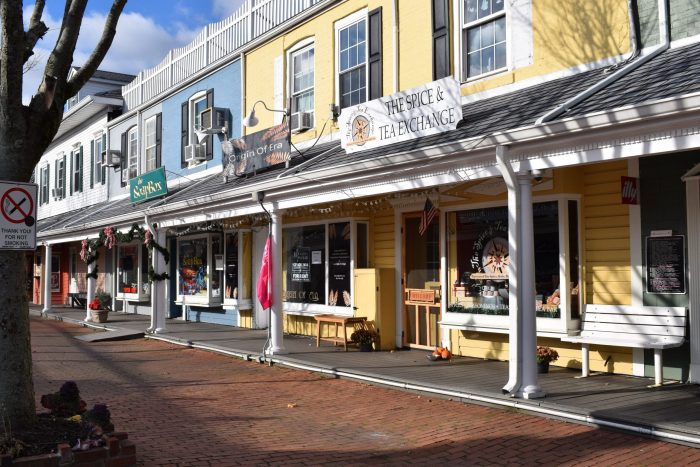Small Business Saturday offers vital support for local downtowns

By Rita J. Egan & Raymond Janis
Residents of communities throughout the area came out on Saturday, Nov. 26, to support local downtowns during Small Business Saturday.
Small Business Saturday was a campaign first developed by American Express in 2010. Martin Cantor, director of the Long Island Center for Socio-Economic Policy, detailed the history and purpose of this effort.
“Because everybody was focusing on Black Friday, American Express wanted to focus on small businesses,” he said.
Mary Joy Pipe, owner of The East End Shirt Company and president of the Greater Port Jefferson Chamber of Commerce, described this year’s iteration of Small Business Saturday as a success. She forecasts a favorable holiday season for the small business community this year based on the turnout.
“Am I optimistic about how I did on Small Business Saturday and over that weekend, and that things should go well?” she said. “Yes.”
The success of these business initiatives, according to Pipe, is primarily contingent upon the weather. She characterized the clear skies on Friday and Saturday as fortunate for the business community.
Tandy Jeckel, owner of TandyWear in Commack, said Small Business Saturday was similar to last year saleswise but that Black Friday was better.
Black Friday “was major,” she said. “We beat last year. Small Business Saturday was pretty much the same as last year.”
Confronting difficult times
While some storefront owners saw favorable returns over the weekend, others discussed the several factors working against their businesses. Among these are nationwide economic instability and inflation, soaring prices and hardships related to the COVID-19 pandemic.
Jeckel said her business did well during the pandemic by making masks to match outfits and so drawing in customers. She added she had noticed customers opting for dressier outfits where people were looking for more comfortable loungewear for a while.
Joe Schwab, co-owner of Schwab’s 2nd Wind in East Setauket, said he didn’t experience an increase in traffic on Small Business Saturday. He said that the special shopping days did not necessarily boost sales, even though Black Friday was better this year than it has been in years past.
“I would love to have a big excitement about shopping days again, but for the time being it seems to be a bit lost or fizzled out,” he said.
Cantor maintains that the broader economic trends are squeezing small businesses and local downtowns. Ballooning costs associated with energy prices, rents and wages are making it harder for small businesses to stay profitable. At the same time, consumers have less discretionary income and, therefore, less to spend in these downtown settings.
“Right now, small businesses are caught between trying to recoup the high rents, energy costs and things like that,” he said. “And then they’re running into the competition and the fact that consumers don’t have the money to spend.”
Competing with big businesses
Inflation and other economic pressures are driving consumers to try to stretch their dollars, Cantor said. This is adding even greater strain on small businesses compared to big businesses.
“The reality is that these big businesses can buy goods and services at much cheaper prices, and consumers are certainly looking for bargains,” he said.
Despite this popular narrative, Patty Kaczmarczyk, owner of Cheese & Spice Market in Wading River, insists that her prices are competitive and often outperform her larger competitors.
“People sometimes feel, ‘I’m going to go to the supermarket where I can get things cheaper there,’ but now that’s not so true,” she said. “I’m a small business, so I’m trying not to kill people in pricing to stay very competitive. That’s my goal.”
Contrasting the business models of large and small businesses, Kaczmarczyk said smaller stores are better adapted to meet the needs of consumers. Whereas large retailers emphasize bulk purchases, she said small vendors allow for smaller, often cheaper orders.
“I carry so many loose spices, which are way cheaper than buying them in a grocery store,” she said. “I sell it loose, and you can buy smaller amounts.” Maximizing these advantages, she suggests, can keep small businesses afloat while competing against their larger counterparts.
Susannah Meinersman, owner of Huntington-based Bon Bons Chocolatier, said the store has been busy in general, which she attributes to making a great product. Meinersman said she appreciates Small Business Saturday: “I think the day brings awareness to the small Main Street business, so that’s a good thing.”
Giving back to the community
David Wolmetz is co-owner of Urban Air Adventure Park in Lake Grove. He described the small business sector as an extension of the greater community. Through various interactions of small businesses with community members, he said these businesses foster a greater sense of local cohesion.
“It’s not only about money for us,” he said. “It’s about connecting to the community.”
For example, Wolmetz sits on the board of the Stony Brook Cancer Center Community Advisory Council. Maintaining connections between small businesses and other local institutions is crucial, Wolmetz said, for community prosperity.
“We look for them: Girl Scouts, Boys Scouts, anything that’s related to our demographic of a youth, family oriented connection,” he said. “I’m very familiar with that connection, and that’s my reason for having the business.”
This connection will be imperative as businesses transition into the post-pandemic era. For Suzanne McEnroe, owner of This n’ That Gifts in St. James, the turnout on Saturday was encouraging.
She said she appreciates resident support as the business owner opened the gift store in February 2020, just a few weeks before the COVID-19 shutdowns. She is grateful to be open.
In general, she noticed a difference in business this year with more people out shopping. “They love to have a town shop to be able to just come and get a quick gift,” she said.
A critical juncture
While Small Business Saturday primarily targets the retail and service sectors, Long Island’s regional economy consists of small businesses across many other industries.
John Hill is the founder and CEO of the Long Island Advancement of Small Business, an organization committed to the growth and development of small businesses that do not interface with customers, such as financial planners, bankers and IT service providers, among others.
Hill contends that these small businesses are struggling, too. “They’re not growing, they’re not failing, they’re just eking out a living right now,” he said.
Given the high living costs on Long Island, Hill sees more small business owners closing up shop and heading to more affordable regions in the country, a startling trend for Long Island’s regional economy.
“We’ve had four people leave our organization to move off of Long Island,” he said. “Two moved to Florida, one to North Carolina and one to Tennessee.”
To stay afloat, Cantor suggests business owners will soon have to find creative ways to attract consumers to downtown areas while eliminating operating expenses.
“Businesses are at a critical juncture,” he said, noting that Small Business Saturday is “super.” He added, “We want all these small businesses to survive, and it’s great that Long Islanders are coming out to the downtowns to shop on Small Business Saturday. But they have to continue to do it.”






